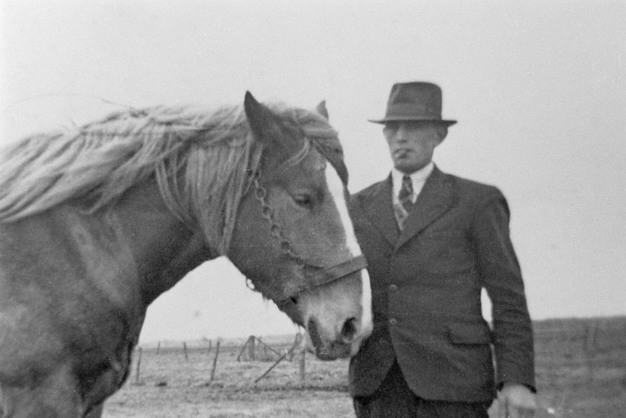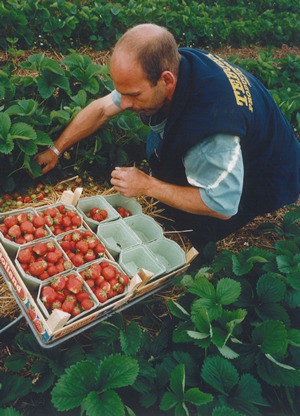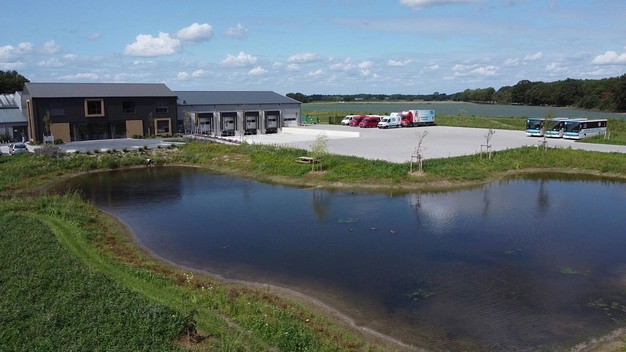May 1945 was not only the month of liberation for the Teeuwen family but also the beginning of the horticultural company at Zandberg 15 in Helden. For the past 25 years, the 80-year-old company's focus has been entirely on asparagus, but this was preceded by a period of cattle, fruit, and numerous outdoor vegetables, including asparagus. This year, Teboza is celebrating its full-year anniversary. In this article, director Will Teeuwen, representing the third generation, looks back and ahead at the history and future of the Netherlands' largest asparagus company.

"My grandfather Lot did come from Helden, but did not live at Zandberg 15; he lived two streets away. That is where my grandmother lived, and they got married in May 1945. My grandmother's father had died young, so my grandfather moved in with her, and from there they started a small-scale agricultural business," Will says. The business provided a wide range of products. "After the war, there was a need for everything, so you can think of anything. They had chickens, pigs, cows, but also grew fruit and field produce, including asparagus."

A specialization in strawberries and asparagus in particular followed in the 1970s and 1980s under Father Math's leadership, although leeks, gherkins, and Chinese cabbage were also grown in those years, and the necessary fattening pigs were raised. Strawberry cultivation, in particular, was an important branch from the 1980s until 2001; strawberries were grown by Teboza, and until the mid-1990s, it was even the main crop.
Market opportunities for asparagus It was Will who decided in 2001 to focus 100 percent on asparagus cultivation. "I still look back on growing strawberries with warm feelings, but back then most of the cultivation still took place outdoors with all the weather risks that entailed. The switch to plastic tunnels was just coming up at that time. I had worked in greenhouses as a trainee at a secondary school of horticulture, and I hadn't liked that very much. I had a lot to do with the strawberry product, but even more with asparagus. Moreover, I saw many possibilities with the white gold, not only in cultivation but also opportunities in the market."
It was Will who decided in 2001 to focus 100 percent on asparagus cultivation. "I still look back on growing strawberries with warm feelings, but back then most of the cultivation still took place outdoors with all the weather risks that entailed. The switch to plastic tunnels was just coming up at that time. I had worked in greenhouses as a trainee at a secondary school of horticulture, and I hadn't liked that very much. I had a lot to do with the strawberry product, but even more with asparagus. Moreover, I saw many possibilities with the white gold, not only in cultivation but also opportunities in the market."
"Asparagus was still an underserved product in my eyes at that time, especially in retail. If it was present there at all, it was often a foreign product. The system also did not allow asparagus to get into Dutch supermarkets, which mostly still went to Germany. The bottleneck was that many asparagus were still sold on the clock, and that did not work well for the supermarkets. We then started offering asparagus at weekly prices, and from then on asparagus also became much more prominent in retail."
 © TebozaLeft: cultivation in Spain, right: Teboza sales team
© TebozaLeft: cultivation in Spain, right: Teboza sales team
Specializing in asparagus proved to be the right strategy. Over the years, the average consumption per Dutch person rose from 250 to 900 grams. "In recent years, we have occasionally looked at expanding into other products, but always came to the conclusion that our strength lies in asparagus. We know everything about it, more than anyone else, and that makes us more future-proof than other companies," says Will.
The importance of the family business is great in this. "The basis of a family business is that you do business from passion. That pushes you that little bit more to go further and harder. Moreover, the family bond creates a more relational atmosphere towards staff, customers, and suppliers, and we want to maintain that. The relationship has to feel good. It's not always about money, but about enjoying working together. That often makes you just that little bit more willing to go that extra mile for the customer."
Fourth generation in place
Meanwhile, the fourth generation of Teeuwen has also entered the family business. "My son Kris is active as Cultivation Manager, both in the Netherlands and our foreign locations, and my other son Rens is going through all facets of the business in the near future," Will says. With this, the future of Teboza is also guaranteed by the family, and the company only looks set to grow further. "We are not about bigger, bigger, bigger, yet we have gone through generations of growth only. Our philosophy is that if people keep eating our product, there is a future for the product and cultivation. Especially when the market was struggling, we often decided to invest counter-cyclically, because if the supply becomes less around you, you have to grow more yourself," Will observes, soberly.
The bulk of sales at Teboza are still focused on the Dutch and Belgian markets. "That is also where we have our hands full. We also see that in other countries where a lot of white asparagus is consumed, such as Germany, France, and Austria, people can largely draw on their own cultivation. We do see sales to, for instance, the Scandinavian countries growing considerably, and the demand for green asparagus is also increasing considerably. More and more European supermarkets are expressing a preference for European products, and that increases sales opportunities, also outside the Netherlands."
Spanish harvest eight months a year
In addition to cultivation in the Netherlands, Belgium, and a collaboration in Italy, Teboza has significantly expanded cultivation in Spain in recent years. "Our commitment is to extend Spanish cultivation as long as possible. This year, we are still harvesting in Spain for five to six months, but in 2026, we want to start harvesting in Spain for eight months a year. The main part of the Spanish crop is green asparagus, but we will also plant trials of white asparagus. With this, we are partly choosing a replacement over the forced cultivation in the Netherlands, which is almost unprofitable due to the high gas price and possible CO2 tax coming our way."
All in all, it is fair to conclude that the Teeuwen family has often stuck its neck out in its market approach, trade fair participation, and internationalization. "That is also being an entrepreneur. If you see opportunities, you jump in, and then you sometimes see afterward what the result has been, but a good entrepreneur can often assess this pretty well by feel. That is not to say that we do irresponsible things. We also stick our necks out more calculatedly now than, say, 20 years ago. Investments are also at a completely different level than back then. You can't afford many mistakes," says Will.

Integrating horticultural innovations into open field
"At the same time, you shouldn't let it stop you from pushing forward either. There are already so many companies that are starting to see challenges more as threats. As a result, the national asparagus acreage is decreasing. Our sector needs it to integrate the innovations that are there in horticulture into outdoor cultivation as well," says Will. He too had thought and hoped that the development of harvesting robots in asparagus cultivation would already be further along. "But the challenges still turn out to be greater than many engineers expected for a product that grows underground under all kinds of weather conditions. But this development is bound to happen. Now the challenge is to make sure that if you invest in a robot or harvesting aid, it can also be properly calculated. Not primarily to reduce the cost price, but from a labor relief point of view."
About the shortage of hands, the asparagus grower does not worry. "As long as you are good to the people and pay well, as is common here in the Netherlands, then the Romanian will happily keep coming here. I would even dare to say that the availability of staff has improved in recent years. However, increased wages are an area of concern. The share of labor costs in the total cost price has risen by 10% in three years so that immediately affects the kilo-cost price. In my view, this cannot continue like this, otherwise, labor will really become too expensive."
Cooperation with other growers has greatly improved in recent years, according to Will. "As the challenges get bigger, there is more consultation with each other. We also see that the relationship with growers supplying us is taking a different shape. After all, a grower wants to grow and not be an accountant. That is why in recent years we have been looking more and more at how we can support our growers, and you get more open communication."

Market information thanks to asparagus plants
Besides asparagus, the sale of asparagus plants also remains an important branch for Teboza. "Not so much because of its share in sales, but this is how we keep in touch with European asparagus growers and identify opportunities and threats at an early stage. For us as a company, that information from the market is crucial," concludes Will, who has no doubt that Teboza will remain a leader in asparagus in the years to come. "Especially if we will soon have our own product for eight months a year and supplement that with imports for the remaining months, we will remain a very strong player in Europe!"
Teboza celebrates its 80th anniversary throughout the year. During Fruit Logistica in Berlin (Hall 3.2 - B34), this will be celebrated with drinks every afternoon from 15.00.
For more information:
Will Teeuwen
Teboza
Zandberg 14b
5988 NW Helden
Tel: +31 (0) 77 307 1444
[email protected]
www.teboza.com










